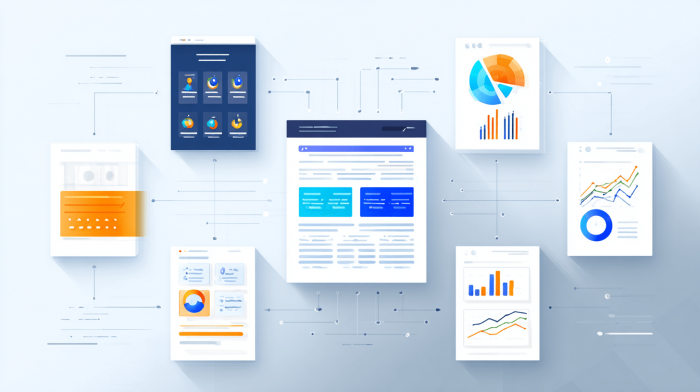In today’s world, offering a quality product or professional services is no longer enough. An equally important aspect of running a company is maintaining a full dialogue with the audience, being able to tell your story, and inviting potential clients to cooperate. A company’s own website is the ideal tool for this – it allows you to present necessary information clearly and conveniently. Yet many business owners still don’t fully understand the benefits of having a corporate web presence. So let’s explore why businesses without a website lose to competitors and what long-term consequences this can lead to.

What no social network can provide a business
Given the inherent limitations of such platforms, here are the advantages of creating a full-featured business website, with special attention to the following:
- Structured navigation. A website allows you to logically organize information, helping users quickly navigate sections, move between pages without confusion, and find what they need even on their first visit.
- Expanded behavioral analytics. With web analytics tools, the business gains detailed insights into how users interact with the site – helping optimize scenarios, improve convenience, and increase overall effectiveness.
- Independent visual identity. Project design reflects the company’s unique style, showcases professionalism, and helps build a cohesive visual image that isn’t limited by external platform templates or formats.
- SEO opportunities. Unlike short-lived reach on social media feeds, website pages are indexed by search engines, ensuring lasting online visibility and generating organic traffic without ongoing ad spend.
- Complete service structure. Each product or service line gets a dedicated page with descriptions, examples, and arguments – allowing the offer to be fully disclosed and tailored to different types of queries.
- Case studies and testimonials. A website allows you to showcase your portfolio in context – displaying results alongside completed tasks and reinforcing them with real feedback, which builds trust and strengthens brand authority.
- Full control over the platform. The company manages all changes independently – from adding products to updating structure – 24/7, with no reliance on third-party algorithms.
How lacking a website affects conversion
Even if a business has a strong offer, positive reviews, and social media activity, without a website all of that remains fragmented. Potential clients see individual pieces, but they don’t understand how the service works, who it’s for, or why this specific company deserves their trust. There’s no structured flow to hold their attention and no space where interest can be converted into action. Everything depends on a random point of contact, which can easily be broken – and in that moment, the advantage goes to those who already have their own platform.
Conversion doesn’t happen on its own – it’s the result of a carefully designed first interaction scenario. Step by step, a user gets answers to their questions and sees the value confirmed, feeling convenience at every turn. Without a website, these conditions don’t exist – there’s no tool to hold attention, respond to diverse requests, or guide the person toward action. Even a motivated user may stop short – not because the offer doesn’t suit them, but because the company hasn’t created an environment that supports decision-making.

Which industries are most impacted by not having a website
In our experience, businesses in the following industries should prioritize creating a corporate website:
| Medical clinics and practices. | When choosing a doctor, people want to immediately see the specialist’s profile, service pricing, working hours, and booking options – all of which must be collected on a convenient, responsive platform. |
| Educational and consulting projects. | To present programs, case studies, work formats, and experts effectively, you need a flexible design and fast performance across devices – the basis of today’s mobile-first approach. |
| Highly competitive industries. | In saturated markets, clients don’t compare every detail – they choose what’s convenient and clear. A professionally designed website reinforces your web presence and helps you stand out. |
| Repair and service companies. | When choosing a local provider, people look for proof, not ads – clear service descriptions, examples of work, reviews, and direct contact with no friction, all of which are only possible on your own platform. |
| Manufacturers and distributors. | A full product presentation requires a well-organized structure to display features, use cases, cooperation terms, and a flexible distributor map that can be updated easily. |
| B2B services and outsourcing. | Buyers here look for experience, clarity, and specific examples. The website must go beyond generalities and show a clear working approach, serving as a lead-generation tool. |
How a website helps you stand out from the competition
It builds an organized service system where every element supports client interaction and lightens the team’s workload. A well-thought-out structure, user-friendly navigation, clear page transitions, CRM and messenger integrations – all of it supports process automation. Requests are handled without a manager, common questions are answered upfront, and irrelevant inquiries are filtered out. If you’re interested in this topic, see our article on website development for agricultural companies, where we show how routine tasks can be reduced, freeing up resources for more important work.
At the same time, a website opens up flexible communication and brand development opportunities. You can adapt it to different audiences, launch targeted pages for specific products or campaigns, and shift focus or structure without relying on external platforms or algorithmic limitations. It’s an environment that belongs to the business and works in its interest, providing full control over all ongoing operations. When properly implemented, the platform doesn’t need constant maintenance – it performs reliably and evolves alongside the company.
What to consider before ordering a web platform
Before use a service of developing a website, it’s important to understand how it will integrate into daily operations and what factors will influence its effectiveness – especially the following:
- Site goals and expected outcomes. Clearly defining the task helps shape the structure properly and align functionality with the needs of the business.
- Amount of information to be prepared. The content provided at the start shapes the logic of the pages, affects the number of elements, and determines the project’s overall pace.
- Contractor experience and specialization. If the team has experience in your field, development goes faster, with fewer explanations and ready-made solutions tailored to your market.
- Budget, timeline, and scope transparency. An agreed work plan, fixed deadlines, and clear service costs establish a reliable foundation for smooth cooperation and sustained trust throughout the project.
- Post-launch support terms. To keep the platform current, it’s crucial to plan for technical support in advance – including regular optimization, updates, and ongoing condition monitoring.
- Scalability and ability to make changes. A website must evolve with the business – it’s important that its structure allows for the quick addition of new sections, blocks, or features without a complete relaunch.
- Clear communication during the project. Ongoing contact, timely approvals, and clearly documented decisions ensure full process control and help achieve results without misunderstandings or delays.
Thinking about building a website? Need a platform that helps you stand out and attract more attention to your business? No problem. The specialists at QuatroIT will analyze your operations and select the optimal platform format, seamlessly integrating its functionality into your business processes. They’ll also explain why it’s important to have a blog on your company’s website, taking care of its implementation and long-term development. Interested? Contact us – the QuatroIT team is here to help.











